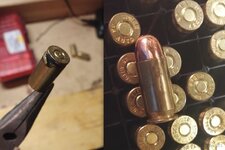- Messages
- 945
- Reactions
- 1,147
So we've all heard the warnings to never shoot someone else's reloads, yet many are quite happy to get "remanufactured" ammo at a (slight) discount over major brands from some guy with a company name and a Dillon ammo plant. So the thought that occurs to me is, what's the difference? I've seen plenty of posts about QC issue with some of the reman ammo, yet guys are still buying it. I gotta say, I trust MY ammo more than any other source, I know my attention to detail is very high, and since I prefer loading on a single stage press, each cartridge is hands/eyes on multiple times during the process. Now I know that not everyone is as meticulous as I am, but apparently neither are the reman guys. And I've gotten some pretty lousy big name ammo from time to time, too. Seems to me like there's a disconnect here somewhere, what do ya'll think? Later.
Dave
Dave












